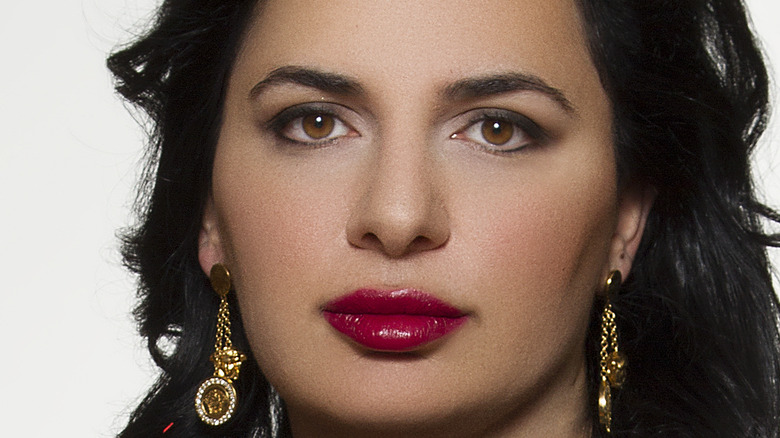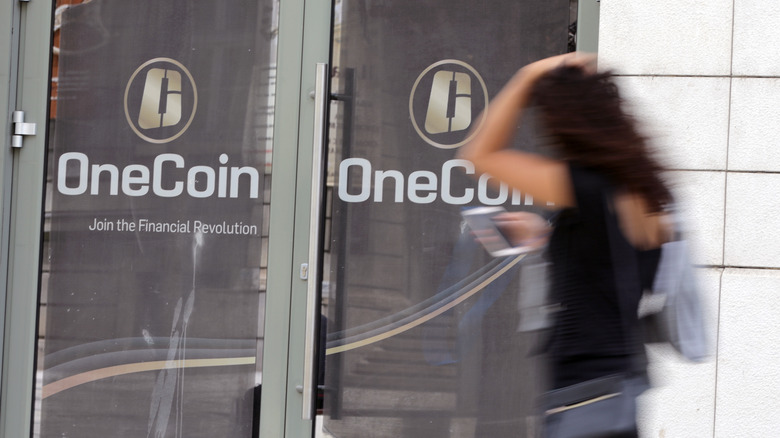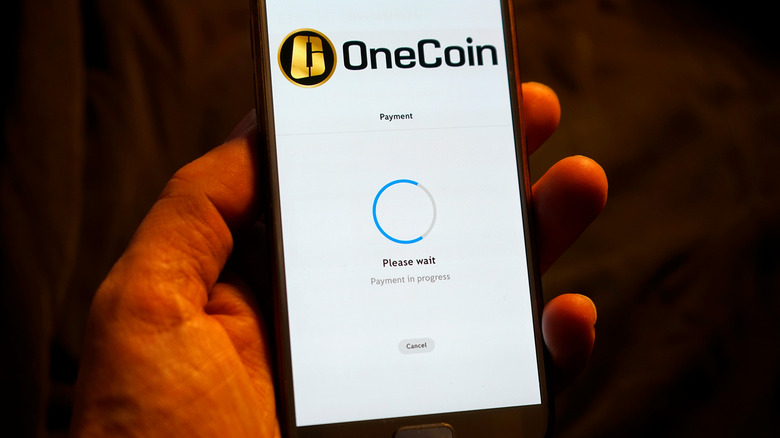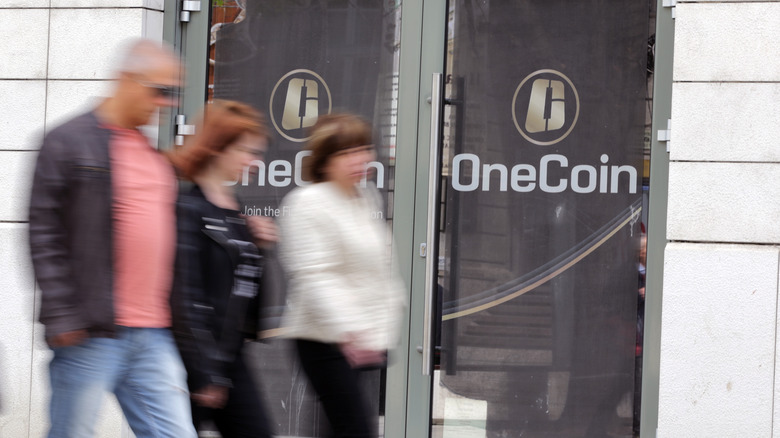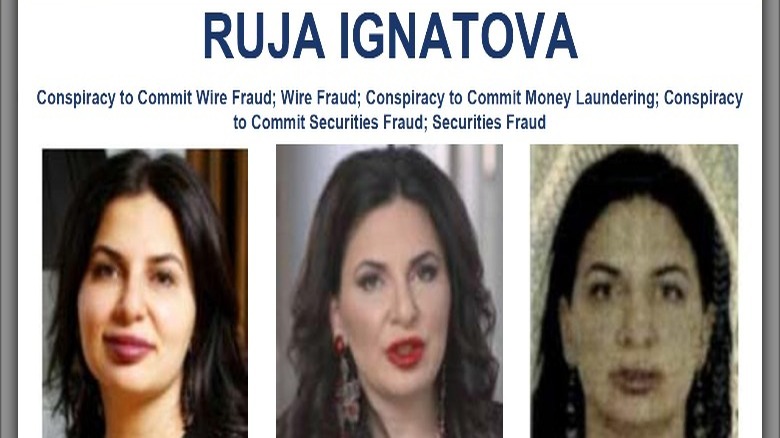The Untold Story Of The Cryptoqueen
Correction 09/09/22: A previous version of this article stated that Bernie Madoff's Ponzi scheme was $50 million. Madoff stole $50 billion not $50 million.
Few things about Ruja Ignatova's life are known for certain. Little is known about her early years, and her career path jumps from failing company to failing company with little explanation. But the one thing that is entirely certain is that Ignatova is responsible for the biggest cryptocurrency fraud in history.
It's estimated that through OneCoin, a fake cryptocurrency Ignatova invented and marketed, she scammed between $4.4 billion to nearly $20 billion out of millions of people worldwide over the course of three years (per Cointelegraph). But OneCoin wasn't even Ignatova's first cryptocurrency scam — she'd already had a practice run. Because of this, Ignatova has been known as the Cryptoqueen.
As of July 2022, Ignatova has been missing for over four and a half years. No one knows whether she's alive or dead or what she even might look like anymore. But as law enforcement agencies across two continents place her on their most-wanted lists and offer rewards for her capture, it's unclear if any information about Ignatova might surface. This is the untold story of the Cryptoqueen.
An unclear education history
Ruja Ignatova was born on May 30, 1980, in Sofia, Bulgaria (via Australian Broadcasting Corporation). She was raised in Bulgaria for her early childhood until her family emigrated to Schramberg, Germany, when she was 10 years old. According to CoinMarketCap, Ignatova always had a fancy flair, and former classmates recall how she never came to school without wearing red lipstick or having her nails done. BuzzFeed also reports that during grade school, Ignatova ended up skipping two years.
In 2006, Ignatova graduated from the University of Konstanz with a doctorate in international law. But while the BBC refers to her as an Oxford graduate, Funancial writes that Ignatova attended the University of Cambridge for her master's degree. During her studies, Ignatova also met German lawyer Bjorn Strehl, and at some point, the two got married. In late 2016, they also had a child together.
After allegedly working at McKinsey & Company, a global management consulting firm (via The Washington Post), in Bulgaria, she and her father, Plamen Ignatov, reportedly bought the Waltenhofen Steelworks in Waltenhofen, Germany.
Bankrupting a company
Ruja Ignatova and her father purchased Waltenhofen Steelworks in the Allgäu after it filed for bankruptcy, claiming that they would help save the plant. However, Bankless Times writes that Ignatova and her father may have even acquired the company illegally. The National World refers to the situation as taking place under "dubious circumstances."
According to Südkurier, the workers at the plant were initially happy with the deal and believed that they would no longer have to worry about their jobs. And initially, things seemed to be running smoothly. In 2010, all-in.de reported an atmosphere of optimism in the foundry. But in 2012, Ignatova and her father secretly sold the company to someone who once again filed for bankruptcy four days later. It was also later revealed that not only were Ignatova and her father embezzling money from the company but they were also accused of taking apart the machinery to ship to Bulgaria for parts.
Funancial writes that "the secret redecoration of the already bankrupt company in early 2012 caused particular indignation among employees." At least 160 people ended up losing their jobs (via Südkurier).
Her first fraud conviction
Ruja Ignatova left Germany after secretly selling the steelworks, and it's believed that she went to London and then possibly Dubai. But her fraudulent behavior in Germany caught up with her four years later when she and her father were convicted of delaying bankruptcy and fraud, writes BuzzFeed.
Ignatova and her father both pled guilty to embezzlement, bank fraud, and fraudulent accounting practices. Ignatova was given a suspended jail sentence of 14 months by the district court of Augsburg, but it's unclear exactly what her father's sentence was. The BBC reports that she was also reportedly fined, as well, but places the date of her sentencing in October 2016, while BuzzFeed places it in April 2016. Ultimately, many of the dates and timelines around Ignatova's story vary, and the story continues to get murkier.
According to bitrates, it's believed that Ignatova and her father stole over €1 million from the Waltenhofen Steelworks. The damage to suppliers amounts to hundreds of thousands of dollars, writes Südkurier.
A practice Ponzi scheme
After embezzling money from Waltenhofen Steelworks, Ruja Ignatova went on to join BigCoin, a cryptocurrency launched by John Ng and based out of Hong Kong. This would essentially become her trial run at a fraudulent cryptocurrency. Jamie Bartlett writes in "The Missing Cryptoqueen" that Karl Sebastian Greenwood persuaded John Ng to hire Ignatova, and she was hired as a legal advisor. By early 2014, she was spending several days a month in Hong Kong promoting BigCoin.
But like its successor OneCoin, BigCoin was a fraudulent currency. And according to CoinMarketCap, "many of the schemes and scam dynamics used in BigCoin were later recycled for OneCoin." BuzzFeed writes that even while Ignatova was promoting BigCoin, emails show that she was already making plans for OneCoin. And after the crash of BigCoin, Ignatova left along with several others, including Greenwood, who would become OneCoin's co-founder along with Ignatova and her brother. Together, they decided to create their own Ponzi scheme currency.
A fake cryptocurrency
On September 16, 2014, Ruja Ignatova launched OneCoin along with Karl Sebastian Greenwood and her brother Konstantin Ignatov (via Bitcoin.com). According to OBC Transeuropa, Ignatova claimed that OneCoin was going to be the next big thing and was going to "bury BitCoin." That year, Ignatova won an award in Bulgaria for entrepreneur of the year. From here, Ignatova started promoting OneCoin around the world — including in the United States — and even held an event at the Wembley Stadium in England in June 2016 (via BBC). And by the end of 2016, Ignatova was claiming that OneCoin had over three million members worldwide. The BBC reports that British people spent over $30 million on OneCoin during the first half of 2016 alone.
But DW reports that while digital currencies are typically backed by "any public, secured, and decentralized blockchain-type technology," OneCoin lacked this and instead claimed to have a "private blockchain," which meant that the currency didn't have its value backed by anything. Meanwhile, investors were encouraged to sell packages of OneCoin to friends and family, also known as a multi-level marketing strategy or a pyramid scheme. OneCoin also couldn't be used to buy anything or be transferred outside the closed system.
But while none of this was really a secret, investors were still drawn to OneCoin. According to the BBC, investors told them this was due to "the fear that they would miss out on the next big thing. They'd read, with envy, the stories of people striking gold with Bitcoin and thought OneCoin was a second chance."
The largest Bitcoin transaction in history
In 2015, Ruja Ignatova was the recipient of the largest Bitcoin transaction in history. According to Finance Feeds, Ignatova reportedly received four USB devices from Sheikh Saoud bin Faisal Al Qassimi — a member of the ruling family of Ras Al Khaimah, United Arab Emirates — that contained 230,000 Bitcoins. At the time, these bitcoins were worth about $50 million. As of July 2022, these bitcoins would be worth over $4.4 billion. If Ignatova still has all these bitcoins, she may be one of the largest bitcoin holders.
In what is referred to by Finance Feeds "well-documented and witnessed transaction" in exchange for the bitcoins, the BBC reports that Al Qassimi received three cheques totalling around 210 million Emirati dirhams, equivalent to roughly $52 million. But before the transaction occurred, the Mashreq Bank in Dubai had already started closing Ignatova's accounts due to money-laundering concerns, so Al Qassimi was unable to cash the cheques. In April 2022, Al Qassimi tried to get the Mashreq Bank to pay out the cheques. But the Middle East Eye notes that as long as Ignatova remains missing, "it is unclear if he will ever see his money."
Dubai is considered to be an "important financial route" for Ignatova (per BBC) because although the headquarters for OneCoin was in Bulgaria, the company was registered as an offshore company in Dubai. In addition, Ignatova held a position with ICAFE, the Intergovernmental Collaborative Action Fund for Excellence, where Al Qassimi also held a senior role.
The fall of OneCoin
Despite the seeming popularity of OneCoin, many were already calling out the warning signs within the first year. By 2015, Bulgaria's Financial Supervision Commission (FSC) put out a warning about OneCoin, writes OBC Transeuropa. By the following year, various authorities were calling for caution, and in December 2016, Italy's Competition and Market Authority blocked OneCoin. CoinMarketCap writes that several European central banks had also warned against investing in OneCoin, and Germany's Federal Financial Supervisory Authority issued cease and desist orders to OneCoin in 2017.
Bjorn Bjercke, a blockchain expert, was also one of the first to speak out publicly about the fact that OneCoin didn't use a blockchain. And as a result of speaking out, he started receiving death threats and has stated (via BBC), "If I knew what I would have to go through, I would have never blown the whistle. I would have just turned my back and walked away."
Bitcoin.com writes that OneCoin's demise was soon being predicted, and despite promises to introduce public blockchain technology, OneCoin never followed through. New York District Attorney Cyrus Vance later stated (via OBC Transeuropa), "OneCoin [was] nothing more than a classic pyramid scheme, built using new technological platforms."
Meanwhile, few investors had caught on, although they were growing more concerned, and Ignatova continued to travel the world and sell OneCoin. Ruja Ignatova was meant to assuage everyone's concerns during a gathering of European OneCoin promoters in Lisbon, Portugal, in October 2017.
Disappearing on Ryanair
On the day of the Lisbon gathering, Ruja Ignatova, who was known for being on time, was nowhere to be found. Per BBC, the OneCoin head office in Sofia had no idea where she was, and rumors started to spread that Ignatova had been either killed or kidnapped by the banks, "who — they'd been told — had most to fear from the cryptocurrency revolution."
By the time Ignatova failed to show up to the Lisbon conference, she'd already started making her getaway. Reuters reports that in late 2017, Ignatov found out that her American boyfriend was cooperating with an FBI probe into OneCoin after bugging his apartment. After discovering this and learning of the international arrest warrant the United States issued for her after a grand jury indictment in October 2017, Ignatova set her plan to disappear in motion (via Complex).
The BBC reports that two weeks after Ignatova missed the Lisbon conference, she boarded a Ryanair flight that was traveling from Sofia, Bulgaria to Athens, Greece, on October 25, 2017. After this flight, Ignatova virtually disappeared. However, it's unclear if she traveled to another country from Greece. According to U.S. v. Konstantin Ignatov, since October 2017, Ignatova has "made no appearances at any public OneCoin events, and has made no public statement regarding her whereabouts." Considering her consistent online presence in this past, this is considered to be unusual. Despite her disappearance, the United States charged Ignatova with eight counts of fraud in 2019, writes National World.
One of the biggest frauds in history
By the time Ruja Ignatova absconded, OneCoin was responsible for one of the biggest frauds in history. According to Vice, OneCoin scammed people from 175 countries between 2014 and 2017 and conned between $4.4 billion to almost $20 billion from its investors (via Cointelegraph). And it's unlikely that investors are going to get most of the OneCoin money back. Digitpol writes that in China, law enforcement was only able to recover about $267.5 million after prosecuting 98 people, amounting to only 1-5% of the total amount defrauded by OneCoin. Although Bernie Madoff's Ponzi scheme is known for being the biggest heist in history as of 2022 at $50 billion, even a third of what Madoff made is no small sum. Even the Great Mining Robbery only amounted to $2 billion.
The BBC reports that estimates about how much money has been put into OneCoin are difficult to make because it has structured its companies and bank accounts to make their assets disappear. When investigating OneCoin's corporate workings, it was found that many of its companies and bank account details are British. British journalist Oliver Bullough notes to the BBC that "British companies are the companies of choice. They've very easy to set up, and they look legitimate." But despite being posted on the Companies House website, many of the companies connected to OneCoin have no information about them, their filing history, or their owners.
Her brother turns on her
After Ruja Ignatova's disappearance, her brother Konstantin Ignatov took over operations of OneCoin. But even Ignatov couldn't keep the officials at bay. CoinMarketCap writes that in early 2018, the OneCoin headquarters were raided by the Bulgarian authorities at the request of German prosecutors. But despite the raid, OneCoin and its website remained operational.
By this point, warnings about OneCoin were relatively widespread. But the BBC reports that as "money started drying up in Europe, promoters turned more and more to countries [in Africa] like Uganda." Sebastian Greenwood was arrested in 2018, and one year later, Ignatov was arrested in Los Angeles at Los Angeles International Airport (LAX) in March 2019. With Ignatov's arrest, OneCoin's operations finally ceased in December 2019.
In 2019, Ignatov pled guilty to several charges, including money laundering and fraud. However, according to FX News Group, Ignatov's sentencing has been delayed until August 10, 2022; he faces up to 90 years in prison. In 2020, Ignatov also agreed to testify against his sister in the event that the case goes to trial. As part of the plea agreement, Ignatov and his family can apply to be placed into witness protection.
The 11th most wanted woman in history
As the search for Ruja Ignatova continued, she became one of the most wanted people across two continents. In May 2022, Ignatova was added by Europol to Europe's most wanted list, reports MoneySenator. The publication said Ignatova was added to Europe's most wanted "on the initiative of the German regulation enforcement authorities," who have been trying to find her since 2020. Rewards of over $5,000 were also offered to anyone who might have information on her whereabouts.
Europol is the EU's largest law enforcement agency, and according to Vice, they suspect Ignatova of "having prompted investors worldwide to invest in this worthless currency." They also describe Ignatova as "the driving force and intellectual inventor" behind OneCoin. By this point, Ignatova was also released from her Bulgarian citizenship while still retaining her German nationality.
On June 30, 2022, Ignatova was also added to the FBI's ten most wanted fugitives list. CBS News reports that Ignatova is only the 11th woman in history to be added to the list. A $100,000 reward is also being offered for information leading to Ignatova's capture.
A new face?
As of July 2022, Ruja Ignatova has been missing for almost five years. And DW reports that since Ignatova ran off with at least $5 billion, she has more than enough money to continue hiding, especially since the authorities in the emirates unfroze her accounts in 2020.
One theory regarding Ignatova's whereabouts states that she is hiding on a luxury yacht in the Mediterranean Sea. However, it's unknown even exactly where her yacht might be. As long as someone is at least 12 nautical miles from the coast, authorities cannot arrest you because no country has jurisdiction. CBS News also notes that she has connections in Bulgaria, Germany, Russia, Greece, and the United Arab Emirates.
Newsweek writes that Ignatova may have taken even more drastic actions. When German investigators published Ignatova's photo and details, they noted that "Ruja Ignatova could have surgically changed her appearance as seen in the photos." It's believed that she may have gotten a new nose, jaw, cheeks, and lips and may also have dyed her hair blonde. However, BBC also reports the possibility that Ignatova may not even be alive anymore. As long as a body isn't found, her whereabouts remain unknown.
